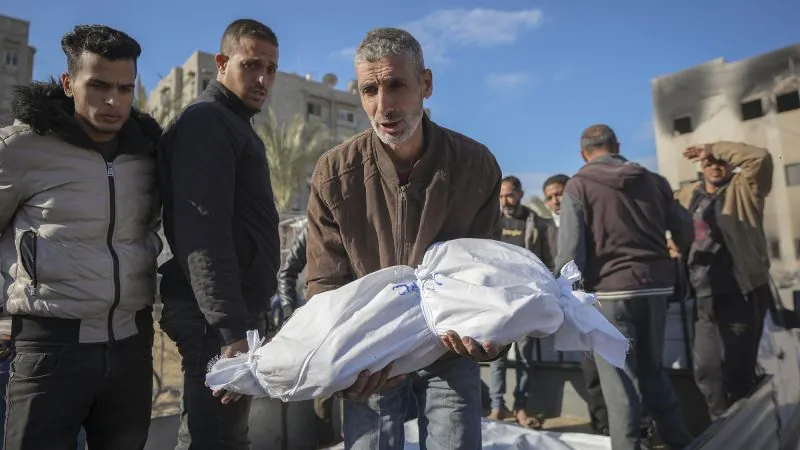
Shocking Underreporting of Gaza Death Toll: New Study Reveals the True Scale of Tragedy
2025-01-09
Author: Ken Lee
Introduction
A groundbreaking study from the prestigious London School of Hygiene & Tropical Medicine (LSHTM) has unveiled an alarming revelation: the death toll in Gaza is vastly understated compared to official figures released by the local health authorities. This peer-reviewed research published in The Lancet journal estimates a staggering 64,260 traumatic injury deaths in Gaza between October 7, 2023, and June 30, 2024. In stark contrast, the Palestinian Ministry of Health reported a mere 37,877 deaths during the same timeframe.
Discrepancy in Death Toll
This shocking discrepancy highlights a potential underreporting rate of 41%. As of October 2024, the estimated total of Gazans who lost their lives due to violence could exceed 70,000, signaling an unimaginable humanitarian crisis that the world is largely unaware of.
Excluded Factors
The study emphasizes that the true death toll from the ongoing conflict is likely even higher, as it excludes deaths resulting from disrupted healthcare, food shortages, lack of clean drinking water and sanitation, and disease outbreaks. As of January 7, health authorities in Gaza reported a death count of 45,885 and confirmed injuries of over 109,196 individuals, primarily based on data from morgue records. The LSHTM study indicates that approximately 3% of Gaza's population may have died due to violence, with the most vulnerable—women, children, and the elderly—comprising 59% of the casualties.
Research Methodology
Researchers employed various data sources, such as hospital morgue records, an online survey, and social media obituaries, combined with a statistical technique known as ‘capture-recapture analysis’ to arrive at these estimates. This method is particularly useful in situations where not all pertinent data is reliably recorded.
Urgency of Interventions
Zeina Jamaluddine, the lead author of the study, stated that the findings shed light on the urgent necessity for immediate interventions aimed at protecting civilians and preventing further loss of life. She described the situation as critical, requiring immediate global attention.
Impact of Military Actions
Israel's military actions, which began following Hamas' attack on October 7, have led to the decimation of key infrastructure, including healthcare facilities, exacerbating the already dire humanitarian situation. As hospitals strain under pressure, humanitarian organizations warn that conditions could deteriorate rapidly if support is not forthcoming.
Water Crisis
A recent report from Human Rights Watch highlighted that Israel has been accused of withholding access to clean water, thus contributing to disease outbreaks that could lead to thousands of additional fatalities. The gravity of the water crisis may remain obscured due to the collapse of Gaza’s healthcare system, hindering efforts to track and address the spread of illness.
International Accusations
Both Human Rights Watch and Amnesty International have leveled accusations against Israel, alleging genocide against the Palestinian population—a claim that Tel Aviv vehemently denies. Simultaneously, the country faces scrutiny at the international level, including proceedings at the International Court of Justice due to allegations of genocide.
Humanitarian Situation
The humanitarian situation continues to worsen, with reports indicating that a Palestinian newborn recently succumbed to hypothermia. In total, at least six infants have died from severe cold and inadequate shelter in recent weeks, while health officials confirmed that the number of hypothermia-related deaths has reached eight, including those of a toddler and a nurse.
Closing Hospitals
Aid organizations such as Médecins Sans Frontières (Doctors Without Borders) have issued alarming warnings that several hospitals in Gaza, including Nasser, Al-Aqsa, and the European Gaza Hospital, are on the brink of closure due to fuel shortages. "This situation threatens the lives of hundreds of patients, including vulnerable newborns, who rely on electricity to survive," the organization stated.
Call to Action
As the world grapples with the implications of this study, it raises critical questions about the international community's role and responsibility in addressing the humanitarian catastrophe unfolding in Gaza. The call for action has never been more urgent—will the global community respond before it's too late?


 Brasil (PT)
Brasil (PT)
 Canada (EN)
Canada (EN)
 Chile (ES)
Chile (ES)
 Česko (CS)
Česko (CS)
 대한민국 (KO)
대한민국 (KO)
 España (ES)
España (ES)
 France (FR)
France (FR)
 Hong Kong (EN)
Hong Kong (EN)
 Italia (IT)
Italia (IT)
 日本 (JA)
日本 (JA)
 Magyarország (HU)
Magyarország (HU)
 Norge (NO)
Norge (NO)
 Polska (PL)
Polska (PL)
 Schweiz (DE)
Schweiz (DE)
 Singapore (EN)
Singapore (EN)
 Sverige (SV)
Sverige (SV)
 Suomi (FI)
Suomi (FI)
 Türkiye (TR)
Türkiye (TR)
 الإمارات العربية المتحدة (AR)
الإمارات العربية المتحدة (AR)